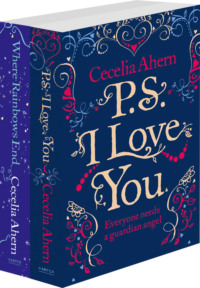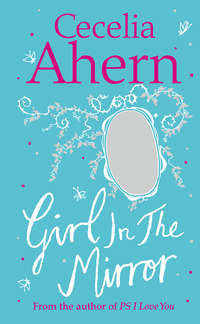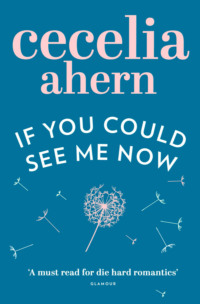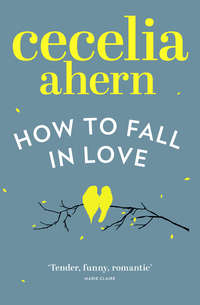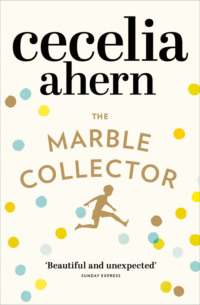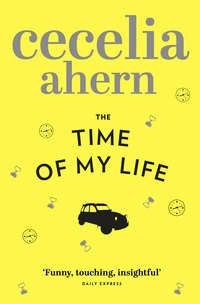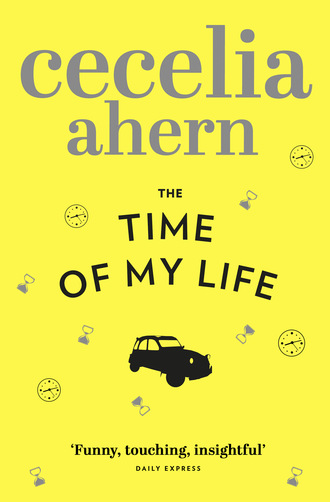
Полная версия
The Time of My Life
She laughed. ‘But why would I ask you that?’
‘I don’t know. Sometimes health spas ask that too, you know, in case you don’t want a male masseuse …’
She chuckled. ‘Well, I can guarantee he won’t be massaging any part of your anatomy.’
She made anatomy sound dirty. I shuddered.
‘Well, tell him I’m very sorry but he can’t come here.’ I looked around at my dismal studio flat that I always felt quite cosy in. It was a place for me, my own personal hovel; it was not for entertaining guests, lovers, neighbours, family members or even emergency services when the rug caught fire, it was just for me. And Mr Pan.
I was huddled up by the arm of the couch and a few steps behind me was the end of my double bed. To my right was a kitchen countertop, to my left the windows and beside the bed was a bathroom. That was about the size of it. Not that the size bothered me, or embarrassed me. It was more the state of it. My floor had become the wardrobe. I liked to think of my scattered belongings as stepping stones, my yellow brick road … that kind of thing. The contents of my previous top-dollar penthouse wardrobe were bigger than the new studio apartment itself and so my too many pairs of shoes had found their home along the windowsill, my long coats and full-length dresses hung on hangers at the right- and left-hand ends of the curtain pole and I slid them open and closed as the sun and moon requested just like regular curtains. The carpet was as I have already described, the couch monopolised the small living area reaching from windowsill to kitchen counter, which meant you couldn’t walk around it but had to climb over the back to sit on it. My life could not visit me in this mess. I was aware of the irony.
‘My carpets are being cleaned,’ I said, then I sighed as if it was just such a nuisance that I couldn’t bear to think about it. It wasn’t a lie. My carpets very much needed to be cleaned.
‘Well, can I recommend Magic Carpet Cleaners,’ she said brightly, as though suddenly jumping to commercial hour. ‘My husband,’ ma husbaand, ‘is a devil for shining his boots in the living room and Magic Carpet Cleaners get that black polish right out, you wouldn’t believe. He snores too. Unless I fall asleep before him I get none the rest of the night so I watch those infomercials and one night I saw a man shining his shoes on a white carpet, just like my husband and that’s what caught my attention. Was like the company was made just for me. They took the stain right out, so I had to go out and get me some. Magic Carpet Cleaners, write it down.’
She was so intense I found myself wanting to invest in black shoe polish in order to test these magical cleaning infomercial people and I scrambled for a pen, which in accordance with the Pen Legislation Act of Since the Beginning of Time was not anywhere in sight when I needed it. With marker in hand I looked around for something to write on. I couldn’t find any paper so I wrote on the carpet, which seemed appropriate.
‘Why don’t you just tell me when you can come see him, save us the back and forth.’
My mother had called a special meeting of the family to gather on Saturday.
‘You know what, I know that this is so important, being summoned by my life and all, and despite having an important family gathering on Saturday, I’d really love to meet with him then.’
‘Oh,’ ewwww, ‘sweetheart, I will make a special note that you were willing to miss that special day with your loved ones to meet with him but I think that you should take that time to be with your family. God only knows how long you’ve got ’em for and we’ll see you the following day. Sunday. How does that grab you?’
I groaned. But not out loud, it was inside, deep within, a long agonised painful sound from a painful agonised place deep inside. And so the date was set. Sunday, we would meet, our paths would collide and everything I’d considered to be secure and anchored would suddenly slip and slide and change beyond belief. That’s what I’d read would happen in a magazine interview with a woman who had met with her life. They provided before and after photos of her for the benefit of the uneducated reader who couldn’t access picture images in their mind. Interestingly, before she’d met her life, her hair hadn’t been blowdried, but it was after; she had no make-up or spray tan on before, but had after; she wore leggings and a Mickey Mouse T-shirt before and was photographed in harsh lighting, but wore a softly draped asymmetric dress afterwards in a perfectly lit studio kitchen where a tall vase of artistically placed lemons and limes showed how life had apparently made her more attracted to citric flavours. She wore glasses before meeting with life, she wore contacts afterwards. I wondered who had changed her more; the magazine or her life.
In just under a week’s time I was going to meet my life. And my life was a man. But why me? I felt my life was going just fine. I felt fine. Everything in my life was absolutely fine.
Then I lay back on the couch and studied the curtain pole to decide what to wear.

CHAPTER FOUR
On the fateful Saturday that I’d been dreading ever since the day before I even heard about it, I pulled up to the electric gates of my parents’ home in my 1984 Volkswagen Beetle that had backfired all the way up the exclusive estate, attracting a few unhealthy glares from the sensitive rich people. I didn’t grow up in the house I was waiting outside and so it didn’t feel like a return to home. It didn’t even feel like my parents’ home. It was a house that they lived in when they weren’t in their holiday house, that they lived in when they weren’t in their domestic house. The fact that I was waiting outside, pending permission to be granted, detached me from it even more. I had friends who drove straight up driveways, knew passwords and alarm codes, or used their own keys to visit their parents. I didn’t even know where the coffee mugs were kept. The big gates had the desired effect, designed to keep out vagrants and deviants – and daughters – though the deterrent for me was being trapped inside. A burglar would climb over them to get into the house, I would scale them to get out. As though picking up on my mood, my car, who I named Sebastian after my grandfather who was never without a cigar in his hand and as a result developed a hacking cough that eventually sent him to his grave, seemed to run out of steam as soon as it realised where we were going. The route to my parents’ house was a tricky system of windy narrow roads in Glendalough that dipped and rose, twisted and turned around one giant mansion after another. Sebastian stopped and spluttered. I wound down my window and pressed the intercom.
‘Hello, you’ve reached the Silchesters’ Home for the sexually deviant, how can we fulfil your needs?’ came a breathy male voice down the line.
‘Father, stop messing about.’
There was an explosion of laughter through the speaker, causing two power-walking Botoxed blondes to end their secret nattering and whip their high pony-tails around to stare. I smiled at them but as soon as they saw me, a brown unimportant thing in a junk of metal, they looked away and shook their VPL-free tight little Lycra-covered raisin bottoms forward again.
The gates made a shuddering sound, unstuck themselves and then parted.
‘Okay, Sebastian, let’s go.’ The car jerked forward, knowing what lay in its wake: a two-hour wait beside a bunch of pretentious automobiles he had nothing in common with. How similar our lives would be. The long gravelled driveway gave way to a car park with a water fountain of an open-mouthed lion spewing up murky water. I parked away from Father’s bottle green Jaguar XJ and his 1960 Morgan +4 which he called his ‘weekend car’, and which he drove wearing his weekend attire of vintage leather gloves and goggles as though he were Dick Van Dyke in Chitty Chitty Bang Bang. He also wore clothes with these items, in case the image was more disturbing than intended. Beside Father’s cars was my mum’s black SUV. She had specifically asked for something that would require minimum driving effort on her part, and she had parking sensors covering so many angles that if a car drove by three lanes away on a motorway it beeped to signal its proximity. On the other side of the gravelled area was my eldest brother Riley’s Aston Martin and my brother Philip’s – the middle child’s – family Range Rover that had been pimped up with all the upgrades including television screens in the backs of the headrests for the kids to watch on their ten-minute drive from ballet to basketball practice.
‘Leave the engine running, I’ll be out in two hours max,’ I said, then patted Sebastian on the head.
I looked up at the house. I don’t know what era it was, but it was not ‘Georgewardian’ as I had joked at the Schuberts’ Christmas party much to my brothers’ amusement, my father’s disgust and my mother’s pride. The house was striking, it was originally built as a manor by Lord Somebody who later gambled away his fortune and it was sold to somebody else who wrote a famous book and therefore we were required by law to place a brass plaque with his name outside the gates for literary geeks but mostly for passing power-walkers with raisin bottoms to look at and frown at because they didn’t have a brass plaque outside their own houses. Famous Literary Writer had an illicit relationship with a male Depressed Poet who built an East Wing in order to get away on his own. The house had an impressive library containing communications from Lord Somebody to Lady Whatever, then more sweet talk from Lord Somebody to Lady Secret while he was married to Lady Whatever, and original writings from Famous Literary Writer which were framed and hanging on the walls. Depressed Poet’s works stood unprotected on the shelf beside a world atlas and Coco Chanel’s life story. He didn’t sell well, not even after he died. After a well-documented tumultuous affair, Famous Literary Writer drank all his money away and the house was sold to a well-to-do German family who brewed beer in Bavaria and used it as their holiday home. While here, they also added on a very impressive west wing and a tennis court, which from the evidence of their faded black-and-white photographs their overweight and seemingly unhappy sailor-suited son Bernhard did not like to avail of. It was also possible to find an original bottle of the family beer in a walnut cabinet in the Silchester bar. The memories and traces of these other lives were palpable in the house and I often wondered what exactly it was Mum and Father would leave behind apart from Ralph Lauren’s latest interiors.
Two animals which I still couldn’t identify greeted me with scowls at the base of the stone steps leading to the front door. They looked like lions but they had horns and two legs twisted together in what could only be described as a debilitating stance that made me think that hundreds of years of staring at the fountain had left them desperate for the toilet. Unless Ralph Lauren was going through a dark phase, my money was on the drunk writer or the depressed poet to have chosen them.
The door opened and my brother Riley grinned out at me like a Cheshire cat.
‘You’re late.’
‘And you’re disgusting,’ I referred to the intercom exchange.
He laughed.
I trudged up the steps and passed over the threshold into the black and white marble-floored hall with double-height ceiling where a chandelier the size of my flat dripped down.
‘What, no gift?’ he said, giving me a hug longer than I wanted just to annoy me.
I groaned. He was joking but I knew he meant it. My family belonged to a very serious religion called the Church of Social Etiquette. The heads of their church were People. As in, every action acted and word spoken was done on the basis of what would ‘People’ think? Part of that etiquette required you to bring a gift to a person’s house even if that person was family and you were just calling by. But we didn’t just do calling by. We did arranged visits, made appointments, spent weeks, months even, trying to rally the troops.
‘What did you bring?’ I asked him.
‘A bottle of Father’s favourite red wine.’
‘Suck-up.’
‘Only because I want to drink it.’
‘He won’t open it. He’d rather wait until everyone he loves is long dead and buried before he even thinks about sitting in a locked room to open it himself. Bet you ten, actually twenty,’ I needed petrol money, ‘he won’t open it.’
‘Your understanding of him is almost touching but I have faith in him. It’s a deal.’ He held out his hand.
‘What did you get Mum?’ I looked around the entrance hall to see what I could swipe for a gift.
‘A candle and bath oil but before you make a thing about it, I found it in my apartment.’
‘Because I bought it for what’s-her-name, that girl you dumped who laughed like a dolphin.’
‘You got Vanessa a gift?’
We were walking through the endless spaces of the house, room after room of seating areas and fireplaces. Couches we were never allowed to sit on, coffee tables we couldn’t put our drinks on.
‘As a consolation prize for going out with you.’
‘She can’t have appreciated it much.’
‘Bitch.’
‘Yeah, dolphin-laughing bitch,’ he agreed, and we smiled.
We reached the final room in the back of the house. Once Lady Somebody’s drawing room and then Depressed Poet’s rhyming room, it was now Mr and Mrs Silchester’s entertainment room: a walnut built-in bar with beer on tap and a smoky mirror on the back wall. In the glass case along the bar stood the original German beer from the 1800s with a black-and-white photo of the Altenhofen family posing on the front steps of the house. The room had plush salmon-toned carpets that your feet sank into, tall leather-upholstered chairs at a cocktail bar and smaller leather chairs dotted around walnut tables. Its main feature was a bay window which overlooked the valley below and the rolling hills beyond. The garden was three acres of rose gardens, a walled garden and an outside swimming pool with fresh water. The double doors from the bar were open and gigantic limestone slabs led down to a water feature in the centre of the lawn. To the side of the fountain and beside the rush of the babbling brook a table had been set up with white table linen, crystal and silverware. In my family there was no such thing as informality. It was such a wonderful picture. Shame I’d have to ruin it.
My mother was floating around the table in a white tweed Chanel to-the-knee number and monochrome flats, swatting away the wasps that threatened to invade her garden party. There wasn’t a hair out of place on her blonde head, she held the same small smile on rose pink lips regardless of what was going on in the world or in her life or in the room. Pimped-up Range-Rover-owner-slash-reconstructive-plastic-surgeon-slash-closet-boob-job-surgeon and middle child Philip was already seated at the table talking to my grandmother who was sitting poised as usual in a floral garden-party dress, back poker straight, her hair scraped tightly in a bun, her cheeks and lips an appropriate rouge, pearls around her neck, her hands clasped in her lap and her legs joined at the ankles, no doubt as learned at finishing school. She sat quietly, not looking at Philip and probably not listening either while she surveyed my mother’s work with her ever disapproving eye.
I looked down at my dress and smoothed it.
‘You look great,’ Riley said, looking away and trying to make me feel that he wasn’t just attempting to fill me with confidence. ‘I think she’s got something to tell us.’
‘That she’s not our real mother.’
‘Oh, you don’t mean that,’ I heard a voice behind me.
‘Edith,’ I said, before I’d turned around. Edith had been a housekeeper for Mum and Father for thirty years. She’d been there for as long as I could remember and brought us up more than any of the fourteen nannies who had been employed to take care of us throughout our lives. She had a vase in one hand and a gigantic bouquet of flowers in the other. She placed the vase down and held her arms out to embrace me. ‘Oh Edith, they’re lovely flowers.’
‘Yes, they are, aren’t they? I just bought them fresh today, I went to that new market down by …’ she stopped, looked at me suspiciously. ‘Oh, no. No, you don’t.’ She moved the flowers away from me. ‘No, Lucy. You can’t have them. Last time you took the cake I’d made for dessert.’
‘I know, that was a mistake and I’ll never do it again,’ I said sombrely, then added, ‘because she keeps asking me to make it again. Ah, come on Edith, just let me see them, they’re beautiful, really beautiful.’ I batted my eyelashes.
Edith resigned herself to fate and I lifted the flowers from her arms.
‘Mum will love them. Thanks,’ I smiled cheekily.
She fought a smile; even when we were kids she’d found it hard to give out to us. ‘You deserve what’s coming to you now, that’s all I can say.’ Then she returned in the direction of the kitchen, while dread filled inside me to the point of bursting. Riley led the way and I struggled to walk down the wide steps with the bouquet which took two of my strides next to Riley’s one. He was down ahead of me and Mum almost lit up like a firework at the sight of her precious son making his way to her.
‘Lucy, sweetheart, they’re beautiful, you shouldn’t have,’ Mum said, taking the flowers from me and over-exaggerating her thanks as though she’d just been handed the Miss World title.
I kissed my grandmother on the cheek. She acknowledged it slightly with a small nod of her head but didn’t move.
‘Hi, Lucy,’ Philip stood to kiss me on the cheek.
‘We’ll have to stop meeting like this,’ I said to him quietly, and he laughed.
I wanted to ask Philip about the kids, I knew that I should, but Philip was one of those people who actually took the enquiry way too far and would go into the verbal diarrhoea of every single thing his children had said and done since I’d seen them last. I loved his children, I really did, but I just didn’t care so much for what they’d eaten for breakfast that morning, though I’m pretty sure it was something to do with organic mangoes and dehydrated dates.
‘I should put these in water,’ Mum said, still admiring the flowers for my benefit though the moment had long since past.
‘I’ll do it for you,’ I jumped at the chance. ‘I saw the perfect vase for them inside.’
Riley shook his head incredulously behind her back.
‘Thank you,’ Mum said, as though I’d just offered to pay her bills for her lifetime. She looked at me adoringly. ‘You look different, did you do something with your hair?’
My hand went immediately to my chestnut mane. ‘Em. I slept with wet hair last night.’
Riley laughed.
‘Oh. Well, it’s lovely,’ she said.
‘That will give you a cold,’ my grandmother said.
‘It didn’t.’
‘It can.’
‘But it didn’t.’
Silence.
I left, and tottered over the grass in my heels to get to the stone steps. I gave up and kicked off my shoes; the stone under my feet was warm from the sun. Edith had moved the vase from the bar but I was happy about that; another errand to waste more time. I calculated in my head that from my late arrival to the flower/vase errand I had passed twenty minutes of the dreaded two-hour stay.
‘Edith,’ I called half-heartedly for nobody’s benefit but my own, moving from room to room, moving further away from the kitchen where I knew she would be based. There were five large rooms facing the back garden. One from Drunken Literary Writer’s time, two from the main original part of the house and then another two from the German beer family. Once I had walked through all of the rooms which were connected by oversized double doors, I stepped out in the hallway and looped my way back round. Across the hallway I could see the massive walnut double doors to my father’s office were open. It was where Famous Literary Writer had penned his famous novel. It was where my father went through endless mounds of paperwork. Sometimes I even wondered if there was anything printed on the paper or if he just liked the feel of it, if it was some nervous disposition that meant he must look at and touch and turn paper.
Father and I have the best relationship. Sometimes our thoughts are so similar it’s almost as if we’re the same person. When people see us they are blown away by our bond, by the respect he holds for me, by the admiration I hold for him. Often he’d take days off work just to pick me up from my apartment and take me off on an adventure. It was the same when I was a child, the only daughter in the family, he spoiled me. Daddy’s girl, everybody called me. He’d phone me during the day just to see how I was, send me flowers and Valentine’s cards so I didn’t feel lonely. He really was a special guy. We really did have a special bond. Sometimes he’d take me to a barley field on a windy day and I’d wear a floaty dress and we’d run around in slow motion and he’d become the tickle monster and try to catch me, chasing me around and around until I’d fall down on the barley which would be all around me, waving back and forth in the breeze. How we’d laugh.
Okay, I lied.
That was probably obvious from the slow-motion barley-field image. I pushed it too much there. In truth, he can barely stand me nor I him. But we do stand each other, just about enough, somewhere on the cusp of standing each other for the sake of world peace.
He must have known I was outside his office but he didn’t look up, just turned another mysterious page. He’d kept those pages far from our grasp all of our lives, so much so that I’d become obsessed about discovering what was on them. When I was ten years old I finally managed to sneak into his office one night when he’d forgotten to lock the door, and when I saw the papers, with my heart pounding manically in my chest, I couldn’t understand a word that was written on them. Law talk. He’s a High Court judge and the older I got the more I came to understand how regarded he was as a leading expert on Irish criminal law. He’d presided over murder and rape trials since his appointment to the High Court twenty years ago. He was a real bag of laughs. His old-school views on many things had been nothing short of controversial; at times, if he hadn’t been my father, I’d have taken to the streets in protest – or maybe that was because he was my father. His parents were academics, his father a university professor, his mother – the floral-dress-wearing old woman in the back garden – was a scientist. Though apart from creating tension in every room she walked into I don’t know exactly what she got up to. Something to do with maggots in soil in certain climates. Father’s a European Universities Debating Champion, graduate of Trinity College Dublin and the Honourable Society of King’s Inns whose motto is ‘Nolumus Mutari’ meaning ‘We Shall Not Be Changed’ and that right there says a lot about him. All I know about my father is what the plaques on his office walls declare to the world. I used to think that everything else about him was a great big mystery that I would someday figure out, that I would unlock a secret and suddenly he would all make sense; and that in the end of his days – he an old man and me a responsible beautiful career woman with a stunning husband, longer legs than I’d ever had before and the world at my feet – we’d try to make up for lost time. Now I realise there is no mystery, he is the way he is, and we dislike each other because there isn’t a part of either of us which can even begin to understand a minuscule part of the other.
I watched him from the doorway in his panelled office, head down, glasses low on his nose reading papers. Walls of books filled the room and the smell of dust, leather and cigar smoke was thick even though he’d stopped smoking ten years ago. I felt a tiny rush of warmth for him, because all of a sudden he looked old. Or at least older. And older people were like babies; something about their demeanour made you love them despite their ignorant selfish personalities. I’d been standing there for a while taking the place in and pondering this sudden feeling of warmth, and it seemed unnatural to just walk away without saying anything so I cleared my throat, then decided to do an awkward knuckle rap on his open door, a manoeuvre which caused the cellophane wrapped around the flowers to rustle loudly. He still didn’t look up. I stepped inside.



